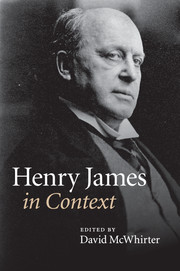Book contents
- Frontmatter
- Contents
- List of Illustrations
- Notes on Contributors
- Preface
- Abbreviations
- Chronology
- Part One Life and career, times and places
- Part Two Historical and cultural contexts
- Chapter 9 Aestheticism and Decadence
- Chapter 10 Authorship
- Chapter 11 Children
- Chapter 12 Consumer culture
- Chapter 13 Cosmopolitanism
- Chapter 14 Courtship, marriage, family
- Chapter 15 Ethics
- Chapter 16 Language
- Chapter 17 Law
- Chapter 18 Manners
- Chapter 19 Media and communication technologies
- Chapter 20 Modernism
- Chapter 21 Money and class
- Chapter 22 Museums and exhibitions
- Chapter 23 Nationalism and imperialism
- Chapter 24 Print culture
- Chapter 25 Psychology
- Chapter 26 Race
- Chapter 27 Realism and naturalism
- Chapter 28 Sexualities and sexology
- Chapter 29 Social sciences and the disciplines
- Chapter 30 Things
- Chapter 31 Time
- Chapter 32 Travel and tourism
- Chapter 33 Urbanity
- Chapter 34 Visual culture
- Chapter 35 Women and men
- Chapter 36 Work
- Part Three Reception
- Further reading
- Index
- References
Chapter 10 - Authorship
Published online by Cambridge University Press: 05 August 2014
- Frontmatter
- Contents
- List of Illustrations
- Notes on Contributors
- Preface
- Abbreviations
- Chronology
- Part One Life and career, times and places
- Part Two Historical and cultural contexts
- Chapter 9 Aestheticism and Decadence
- Chapter 10 Authorship
- Chapter 11 Children
- Chapter 12 Consumer culture
- Chapter 13 Cosmopolitanism
- Chapter 14 Courtship, marriage, family
- Chapter 15 Ethics
- Chapter 16 Language
- Chapter 17 Law
- Chapter 18 Manners
- Chapter 19 Media and communication technologies
- Chapter 20 Modernism
- Chapter 21 Money and class
- Chapter 22 Museums and exhibitions
- Chapter 23 Nationalism and imperialism
- Chapter 24 Print culture
- Chapter 25 Psychology
- Chapter 26 Race
- Chapter 27 Realism and naturalism
- Chapter 28 Sexualities and sexology
- Chapter 29 Social sciences and the disciplines
- Chapter 30 Things
- Chapter 31 Time
- Chapter 32 Travel and tourism
- Chapter 33 Urbanity
- Chapter 34 Visual culture
- Chapter 35 Women and men
- Chapter 36 Work
- Part Three Reception
- Further reading
- Index
- References
Summary
Students of Henry James have long been aware that the most important early articulation of James’s literary and aesthetic theory, his famous essay ‘The Art of Fiction’ (1884), was written in direct response to an essay published under the same title by the English novelist Walter Besant (originally delivered as a lecture to the Royal Institution in the same year), yet the significance of this exchange in terms of establishing James’s position within a broader debate on the status of the modern professional author has rarely been understood. The name of Walter Besant has survived in James criticism largely as a token backdrop for the dramatic unfolding of James’s groundbreaking account of the nature of ‘experience’, ‘reality’ and ‘impressions’ in fiction, or as signifying a naively empiricist ‘Victorian’ realism to James’s sophisticated proto-modernism. Not only does this overlook a surprising degree of commonality in their views on the subject (it was Besant, after all, who initiated a discussion of the novel as a medium of ‘fine art’ and emphasized ‘beauty of workmanship’ and ‘style’ as his most important critical considerations), but it also underestimates the cultural stature of Besant as an antagonist. In the year preceding his lecture on the art of fiction, Besant had organized the first meeting of the Society of Authors, the last and most successful of several attempts to establish an institutional body providing material support and social accreditation to professional authors during the nineteenth century. In his lecture, Besant explicitly connects his desire to elevate the practice of fictional art with the Society’s more ambitious project for enhancing the cultural prestige and material rewards of professional authorship. Besant went on to become the foremost public advocate of literary-professional status during the late-Victorian period, a position which made him synonymous, for many contemporaries, with the aggressive assertion of the ‘rights’ of the author.
- Type
- Chapter
- Information
- Henry James in Context , pp. 105 - 114Publisher: Cambridge University PressPrint publication year: 2010
References
- 1
- Cited by



